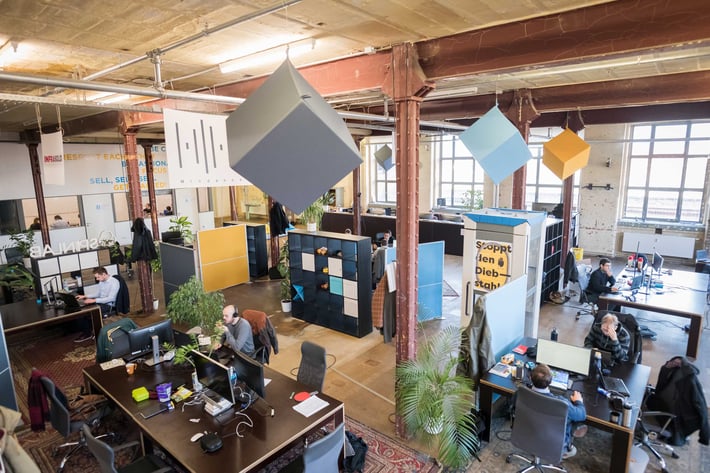If you're a new founder, you might have already asked yourself the question - "How do startup accelerators work?"
And we're going to get to that, but first, for all of our newest founders, let's really startup from rock bottom with all this startup accelerator stuff.
Startup Accelerators? WTF could those be? If you’re not actively involved in one of the world’s many startup scenes, it may not actually be clear to you what such an establishment actually is, or maybe if you’re new to this stuff as a whole, you might not have even ever heard this term before.
I mean, it sounds weird right, an accelerator? Is that like something that helps things move really fast or something?
Well it’s confusing. There’s a lot of buzz words that come and go in the whole startup / founder / tech / entrepreneur world that someone should probably write a dictionary just for these terms. That’s probably an idea that would make some serious money…
But we’re here to answer, in our own words, based on our own experiences, successes, and of course, failures, what exactly is as startup accelerator?
So alas, in the most plain verbiage possible and without further ado:
What does a Startup Accelerator do?
"In our own definition, a Startup Accelerator is a place where early phase startups can go to get necessary coaching and access to relevant networks to help them scale their businesses as quickly as possible."
That's really the simplest startup accelerator definition we can come up with. I suppose, if someone wanted to cram that definition into once sentence, you could simply say a startup accelerator is a place dedicated to helping startups.
As imaginable, within the realm of that definition lies an almost infinite amount of finer details as there now thousands of startup accelerator programs active worldwide.
Startups operate in different phases, with different concepts, representing different industries, so there is typically no ”One size fits all” approach that works with every startup.
But the main goal stays the same, startup accelerators try to prepare founders for scaling.
The SpinLab is not different in this respect, as that is, and always will be our main goal, and what drives us to do what we do every single day.
A Startup Accelerator is a place where early phase startups can go to get necessary coaching and access to relevant networks to help them grow properly as quickly as possible.
Now let's revisit our question - How do startup accelerators work?
Getting your startup to belong in the world can be a daunting task, and accelerator programs can certainly help with this.
It can vary from accelerator to accelerator, but most programs have a duration of 3, 6, or 9 months, and generally what startup accelerators do looks something like this:
- Application Phase. You’ll typically have to apply online for the accelerator program, and if your idea and team are good enough to make it through the first round of reviews, you’ll typically be invited to come pitch your project in person at the accelerator.
- Welcome Week. If accepted, you’ll usually have some sort of orientation week in the beginning to get to know the accelerator team, any associated partners, investors, and/or mentors, and your fellow founders who will be going thru the program with you.
- Coaching Coaching Coaching. This is where all accelerators typically develop their own plan based on their specific goals. But this is the meat and bones of the entire program, figuring out where your weaknesses as a company are and working together to strengthen them and help you overcome these obstacles. This may be in the form of actual consultation and coaching from the accelerator team, trying to introduce you to certain investors who are interested in your industry, helping your startup acquire venture capital, trying to get you relevant pilot projects with bigger, more established companies, or any mix of examples like this.
- Demo Day. Most accelerators will host a Demo Day at some point, we typically see this at the end of most programs (ours is hosted in the middle), but this is where the accelerator typically invites its entire network to come watch the startups pitch, to see what progress they’ve made in the program and helps the startups make necessary business connections.
This all sounds great, but how do Startup Accelerators actually make money? Breaking down the startup accelerator business model.
Like all businesses, the model can vary, but with startup accelerator business models, startup accelerators tend make money in the form of company ownership.
Meaning if your company is accepted into a startup accelerator program, it is possible that the accelerator will then own anywhere from 5-25% of your company, even as you scale.
Some accelerators may even charge the startup money for certain services, but this is not typical.
The SpinLab is a bit unique in this respect, as we don’t take any equity or shares from any of our accepted startups, nor do we charge startups any money to partake. Our program is 100% free for accepted startups, and your company stays yours.
We operate with entirely founder-friendly model, that involves numerous corporate partnerships we have forged over the years.
Who should apply to startup accelerator programs?
There’s a lot of reasons a startup should consider applying for a startup accelerator program, but the general rule here is that you should already be starting to see the business become a reality.
What we mean by that is your concept is strong, you’ve done basic market research, you’ve got a founding team, the first draft of your business model is written, and maybe you’re already talking to prospective customers.
This is the general middle ground we have found that has been successful in our program. If you’re too early in the process, you’ll easily get overwhelmed in the process and will feel left behind, if you’re too far ahead, it might be hard to get as much value from the program as you can.
How can a startup best prepare their application for an accelerator?
Treat the accelerator application as a job interview. In the end, it is a competition so you want to make sure you’re reflected in the best way possible. Here’s some tips we can share that will greatly help your chances of getting accepted into the program of your choice.
- Tailor your application for the specific accelerator. It’s very obvious when you’ve taken one single application, and have just blasted it out to every accelerator on the planet with an open application. We pick up on this, and founders that do this very rarely get next phase.
- Send in your pitch decks as a PDF. Sending a Powerpoint or Keynote file is just asking to run into trouble. There’s just too many wildcards involved with doing this, sending a PDF insures your pitch deck will look exactly the way you want it to.
- Fill out the application entirely. Sure, not all of the questions are required, but the more information you give us the better decision we can make regarding your startup’s application.
- Read the application in its entirety! This drives us absolutely crazy, when we get questions about the application that are very clearly addressed in the application itself. It just makes you look lazy.
- Try to be original Like everything else, that accelerator you’re applying to has seen 100’s if not 1000’s of applications before yours. After a while, they all start to look the same. Don’t be afraid to break past the mold and have your application be a little bit more memorable.
More tips on applying for a startup accelerator program
If you’re a new startup founder, you might be completely overwhelmed with everything you’ve got to do on a day to day basis in order to keep you company alive in this critical phase.
We blog about our best tips for startups that we’ve seen within our own startup community, AND with ourselves.
It wasn’t so long ago that we ourselves were a startup, and in some respects, we still do consider ourselves a startup.
Below you’ll find a list of our best articles that go over other aspects of the startup world, that can help you reach a decision, of whether or not a startup accelerator is the right next step for your company.
- Venture capital and startups, how you can demonstrate promise before you even start searching for funding - Are you a founder looking for your first VC round? We’ve got some tips for you here.
- How to pitch a startup - A recap how one of our former founders won a pitch competition, see what strengths his pitch had, and how you can incorporate them into your own pitching strategy. One other related tip here, your startup pitch should always be a PDF.
- Startup lessons learned - As we mentioned we also consider ourselves a startup. See some of the growing pains we had in the early phases, so you also can know what to expect.
- What customer service means for your startup - Nowadays your entire customer journey is everything. If you’re not taking proper care of your customers the entire time, you’re going to lose out to your competition.
- How to not mess up your logo as a startup - Your logo is the soul of your brand. Check out some basic logo tips here, so you can avoid the mistakes we’ve already seen that founders make.
- Startups and crowdfunding, how you can make it work for you - One of our class 4 Alumni Startups completely crushed a crowdfunding goal. See how they did it and why it worked.
- Why startups should keep all web content in house - It’s tempting to outsource that website design to an agency, but it can hurt you long term.
- 7 Public Grants in Germany for your startup - free money possibilities for your new and growing enterprise.
 What's a startup accelerator? A place where startups can learn how to scale as quickly as possible
What's a startup accelerator? A place where startups can learn how to scale as quickly as possible
Conclusion
Startup accelerators can be a really great thing for new founders, but like all things and decisions in life, do your research and weigh your options.
This is especially relevant if the accelerator you’re interested in is looking to take stake in your company, get all the facts on the table and make an informed decision before signing anything.
But if everything makes sense and the program aligns with what and how you want your startup to grow, then by all means, apply and get accelerated!
Got more questions on the topic? We’d be happy to help, just leave them in the comments below and we’ll get a discussion going.






/RootCamp_Logo-Ecosystem.png?width=200&name=RootCamp_Logo-Ecosystem.png)
/Bitroad_Logo-Ecosystem.png?width=200&name=Bitroad_Logo-Ecosystem.png)



/White%20Versions/stadt_leipzig_white.png?width=130&name=stadt_leipzig_white.png)
/lfca_white.png?width=119&name=lfca_white.png)

/White%20Versions/sachsen_signet_white.png?width=65&height=79&name=sachsen_signet_white.png)